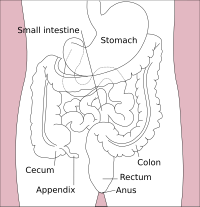
Photo from wikipedia
The aging process and the concomitant physiological changes that come with increasing age have been a focus of researchers and the general population for centuries. The pursuit of knowledge and… Click to show full abstract
The aging process and the concomitant physiological changes that come with increasing age have been a focus of researchers and the general population for centuries. The pursuit of knowledge and understanding of the aging process was famously articulated by Aristotle, stating, "education is the best provision for old age." This remains true today in our quest to understand the physiological underpinnings of aging and the incessant attempt to slow or reverse many of the processes. The need to understand normal aging physiology is important to guide future targeted interventions to promote autonomy and prevent impairment of functioning. The risk of frailty, "vulnerability to stressors" and impaired or decreased functioning of a multitude of body systems is a major public health consideration for adults 65 years or older [1]. While there has been a plethora of research on the aging effects of different systems throughout the body, the following literature review will focus on our recent understanding of the components of nutrient handling, specifically the endocrine system in older adults. By understanding the normal physiological changes that occur in response to nutrients, future interventions can be targeted to promote an extension of optimal functioning throughout the lifespan. The endocrine system is responsible for directing and controlling many homeostatic pathways within the body and many of those pathways begin with nutrient intake. The endocrine system is composed of a convoluted, complicated, and interconnected network of pathways that determine important mechanistic actions occur such as growth, development, energy storage, cell differentiation, and cell death and recycling. Regarding nutrient intake, the pancreas represents one of the first hormonal decision-makers. Notably, the pancreas responds to nutrient intake by releasing insulin in response to the macronutrient composition of the ingested food. The physiological response of the pancreas to nutrient intake is critical throughout the lifespan to maintain glucose homeostasis and ensure adequate energy storage in the body. The normal physiological aging process has the potential to impact the efficiency of this system and therefore impact many of the downstream features of insulin and the pancreatic response to nutrients. The following literature review will detail the normal physiological action of the pancreas in response to nutrient intake and describe nutrient handling in aging. Then, extend the findings into the aging process to provide insight for future interventions aimed at prolonging the optimal functioning of the endocrine system.
Journal Title: Current diabetes reviews
Year Published: 2022
Link to full text (if available)
Share on Social Media: Sign Up to like & get
recommendations!